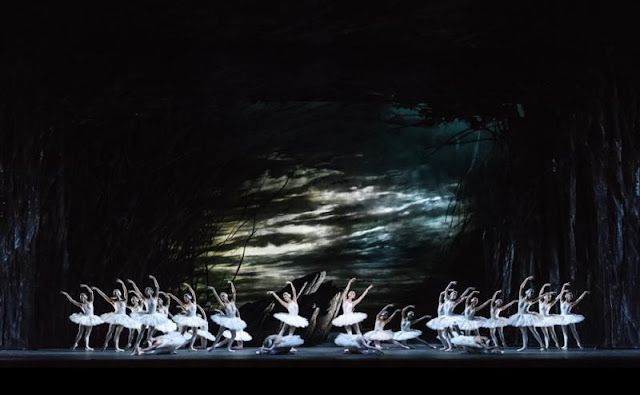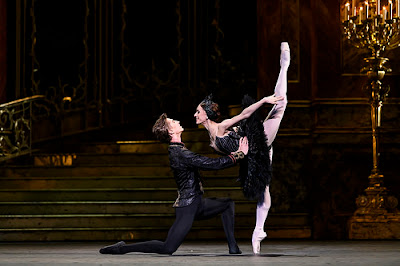 |
| Royal Ballet - Swan Lake - © 2018 ROH. Photograph by Bill Cooper |
Now the Royal Ballet has revealed a new production created by Liam Scarlett with designs by John MacFarlane. We caught the performance on Friday 1 June 2018 with Marianela Nunez as Odette/Odile, and Vadim Muntagirov as Siegfried, conducted by Koen Kessels.
The new production has links to the 1987 one, both are set in early 20th century Russia. John MacFarlane has supplied some stunningly painterly designs for Acts One, Two and Four, with a startlingly realistic and very over the top marble and gilt interior of Act Three. Within this, Scarlett has re-thought the dramaturgy so that for Act One the prince's tutor has gone, and we have Prince Siegfried's friend Benno and Von Rothbart, disguised in human form and acting as advisor to the Queen. It makes a great deal more sense of the drama.
Within this Scarlett has created a very, very Romantic Swan Lake. Tutus are back (they were dropped in favour of something longer in the 1987 production). This, in itself, gives the white acts their very, very traditional look.
 |
| Royal Ballet - Swan Lake - © 2018 ROH. Photograph by Bill Cooper |
The changes are quite substantial, and Drigo introduced a number of orchestrated piano pieces. Tchaikovsky accepted the need for revision for the new production, but died before he could work on it. Most companies use their own version of the score, but the Drigo revision is the basis. Going back to the original is difficult, some of Drigo's changes are essential. To take one example, Siegfried and Odile's pas de deux in Act Three includes a section with violin solo. This was introduced by Drigo (the music comes from Tchaikovsky's original Act One) to echo the Siegfried and Odette pas de deux with violin solo in Act Two.
 |
| Vadim Muntagirov as Prince Siegfried and Marianela Nuñez as Odile in Swan Lake, The Royal Ballet © 2018 ROH. Photograph by Bill Cooper |
For the new production Scarlett has adjusted Act Four to remove some of Drigo's changes but the programme book did not go into details. As ever, I find it frustrating that for textually complex works (opera and ballet), programme books never go into detail exactly what we are hearing/seeing. For those interested, the Wikipedia article on the 1895 production has lots of detail for the Tchaikovsky/Drigo score. I have always found it fascinating that whilst ballet companies will give full details of all the choreographers involved in the version of Swan Lake being performed, the score is usually simply attributed to Tchaikovsky with no additional explanations.
The biggest change that Scarlett made was to the ending - Von Rothbart's demise was achieved by Odile's suicide and the ending, rather than apotheosis, was Prince Siegfried cradling Odile's body with a vision of Odile appearing above. A contemporary twist which I do not think works well with the music.
And what of the dancing?
 |
| Marianela Nuñez as Odette in Swan Lake, The Royal Ballet © 2018 ROH. Photograph by Bill Cooper |
As the lead couple Marianela Nunez and Vadim Muntagirov were coruscating. Nunez was a mature and expressive Odette/Odile, fluid in her movements and with a lovely aura of romanticism as Odette. Her Odile was technically fizzing and she rightly drew huge applause after the Act Four pas de deux, but I have seen Odiles who have radiated a far more hard-edged sense of evil. But then again, most ballerinas veer towards either Odette or Odile. Muntagirov was powerfully supportive, noble of bearing and also technically fizzing in Act Three.
Elizabeth McGovern was elegantly expressive as the Queen, with Bennet Gartside glowering wonderfully as Von Rothbart. In Acts One and Three, with Von Rothbart in human form, Gartside stalked around thunderously looking remarkably like Vladimir Putin. He was far more traditional in the white acts, the epitome of Romantic Evil.
Alexander Campbell as Benno contributed some brilliantly crisp solos and partnered Akane Takada and Francesca Hayward as Prince Siegfried's elegant and lively sisters. But it was Benno's relationship with Prince Siegfried which intrigued, you couldn't help feeling that what Siegfried really wanted to do was run off and get frisky with Benno!
Any production of Swan Lake is a work in progress, and this will surely develop and deepen (we saw the 8th performance of the current run of 20 finishing on 21 June, but of course it will be back.
Elsewhere on this blog:
- 90th birthday celebration: my interview with composer Thea Musgrave - interview
- Comedy & pathos: Mozart's Cosi fan tutte at Opera Holland Park (★★★★) - Opera review
- Elegie: Rachmaninoff, a heart in exile, Lucy Parham & Henry Goodman (★★★★) - Cd review
- Sparkling opener: Verdi's La traviata at Opera Holland Park (★★★★½) - Opera review
- The Dark Lord's music (★★★½) - CD review
- Worth seeking out: Verdi's La Traviata from Hampstead Garden Opera - (★★★½) opera review
- George Benjamin & Martin Crimp's Lessons in Love and Violence (★★★★½) - Opera review
- A heart in exile: pianist Lucy Parham talks about her latest composer portrait - interview
- Prophetiae Sibyllarum: Gallicantus (★★★★) - CD review
- Interesting programmes, strange timing - homages to Lully and Louis Couperin at London Festival of Baroque music (★★★★ / ★★★½) - concert review
- Musical style is like a language: I chat to German composer Moritz Eggert - Interview
- Alan Rawsthorne - a portrait: Chamber music and woodwind concertos (★★★) - CD review
- Unashamedly Romantic: Reynaldo Hahn chamber music from James Baillieu and friends (★★★★½) - CD review
- Transcendent mysticism: Vaughan Williams' Mass from St John's College (★★★★★) - CD review
- Te Deum: Purcell & Charpentier at Westminster Abbey for London Festival of Baroque Music (★★★★) - Concert review
- All-star Orfeo - Iestyn Davies and Sophie Bevan at the London Festival of Baroque Music (★★★★) - Concert review
- Sonorous debut: Neil Ferris & Sonoro in Frank Martin & James MacMillan (★★★★) - CD review
- Home











No comments:
Post a Comment